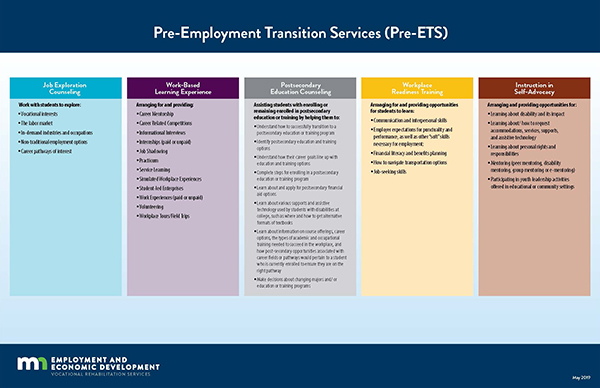 Find your VRS Student Career Services Staff.
Find your VRS Student Career Services Staff.
These are the five activities in Pre-Employment Transition Services.
Job exploration counseling is intended to foster motivation, consideration of opportunities and informed decision-making. Job Exploration Counseling may include research, discussion or information on:
Resources for career planning and job search.
Work-based learning is an educational approach or instructional methodology that uses the workplace or real work to provide students with the knowledge and skills that will help them connect school experiences to real-life work activities and future career opportunities. Work-based learning experiences, may include:
Such counseling may include:
Training and Education Resources
Workplace readiness traits describe a number of commonly expected skills that employers seek from most employees. Work readiness skills are a set of skills and behaviors that are necessary for most jobs. Work readiness skills are sometimes called soft skills, employability skills, or job readiness skills.
Workplace readiness training services may be offered on an individual basis or in a generalized manner in a classroom or other such group settings to provide programming to assist students with disabilities to develop social skills and independent living skills necessary to prepare for eventual employment.
These services could teach skills such as:
Self-advocacy refers to an individual's ability to effectively communicate, convey, negotiate or assert his/her own interests and/or desires and to learn about self-determination. Self-determination means that individuals with disabilities have the freedom to plan their own lives, pursue the things that are important to them and to experience the same life opportunities as other people in their communities. It means taking the responsibility for communicating one's needs and desires in a straightforward manner to others.
Self-advocacy instruction can include:
The pre-employment transition services provided under the VR program are funded by a grant from the U.S. Department of Education with a state match. For federal fiscal year 2023, the total amount of federal grant funds used for these services $7,113,807.